鲁教版八年级上册unit 2 what should i do
文档属性
| 名称 | 鲁教版八年级上册unit 2 what should i do |
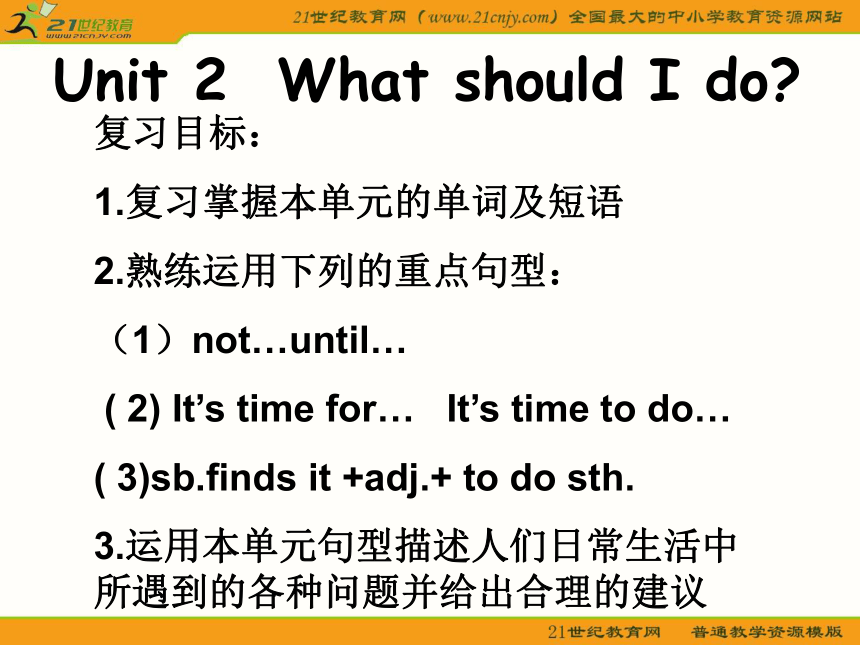
|
|
| 格式 | rar | ||
| 文件大小 | 659.4KB | ||
| 资源类型 | 教案 | ||
| 版本资源 | 鲁教版(五四学制) | ||
| 科目 | 英语 | ||
| 更新时间 | 2011-07-14 00:00:00 | ||
图片预览

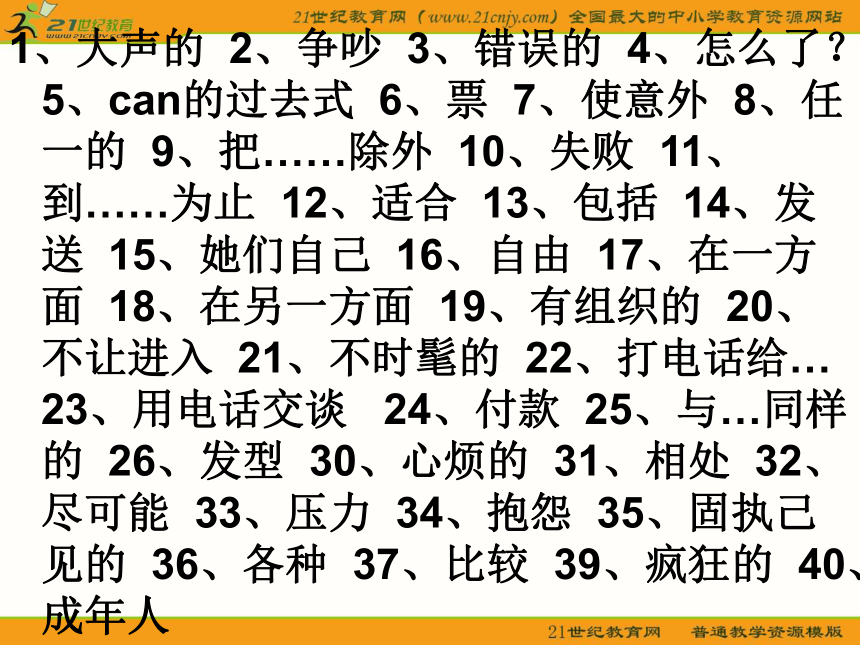
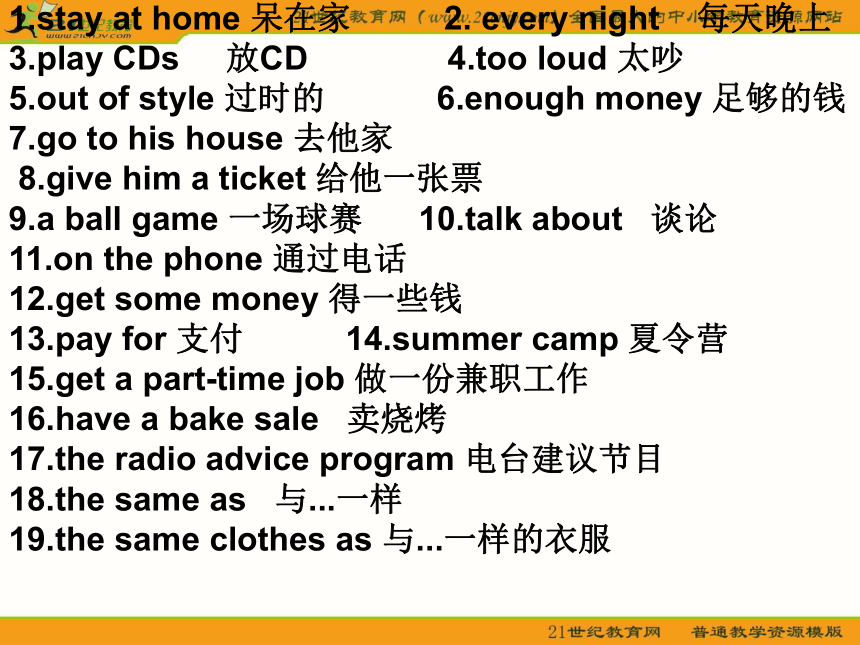
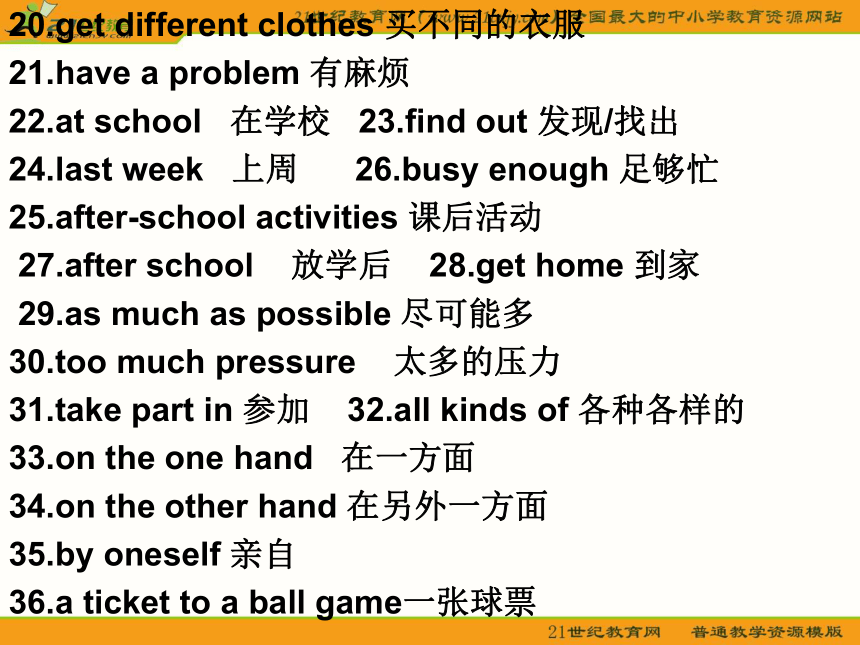
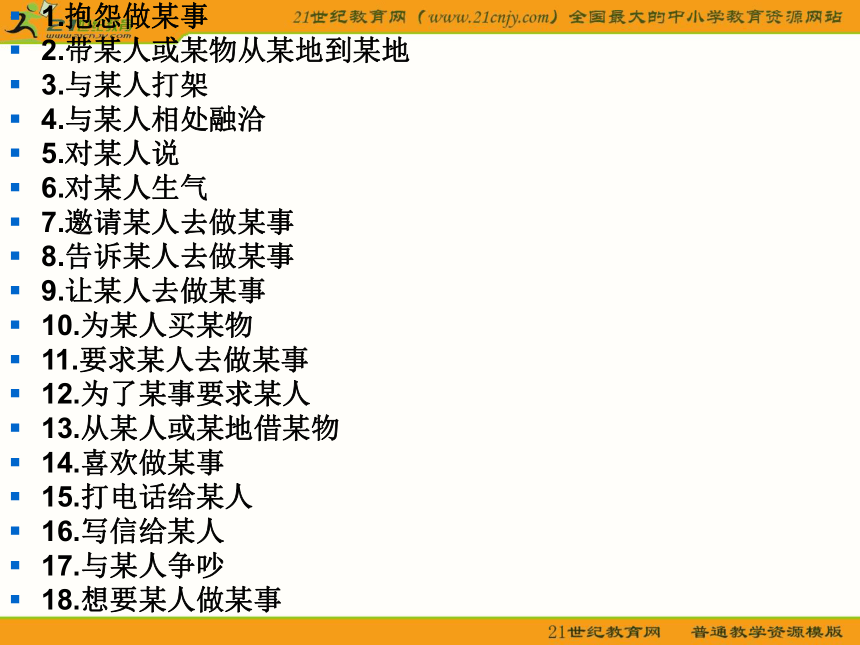
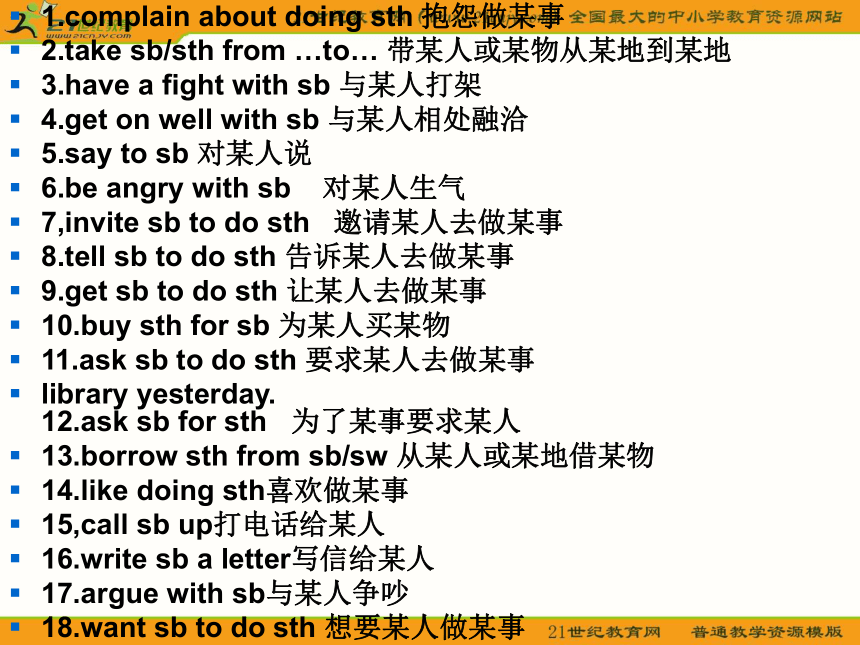

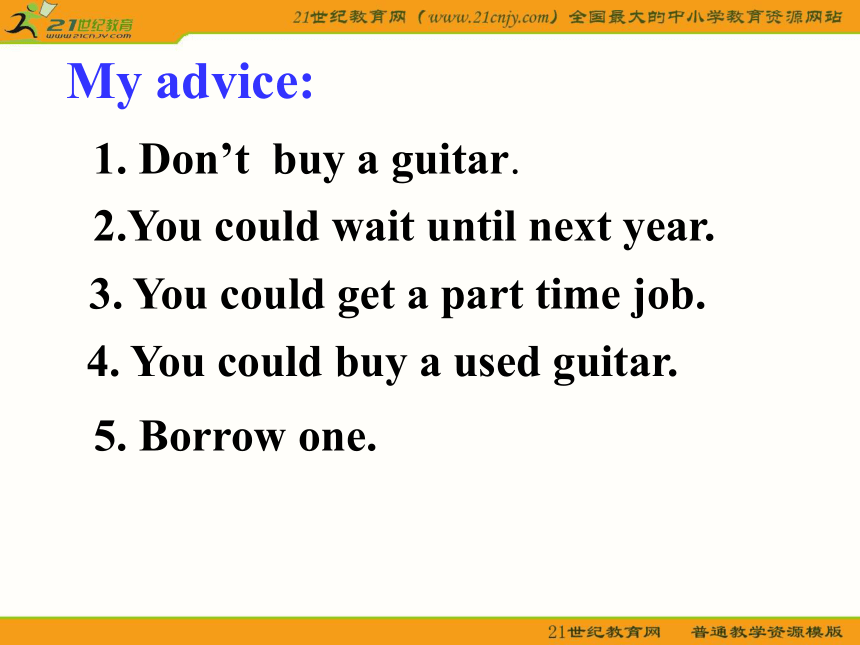

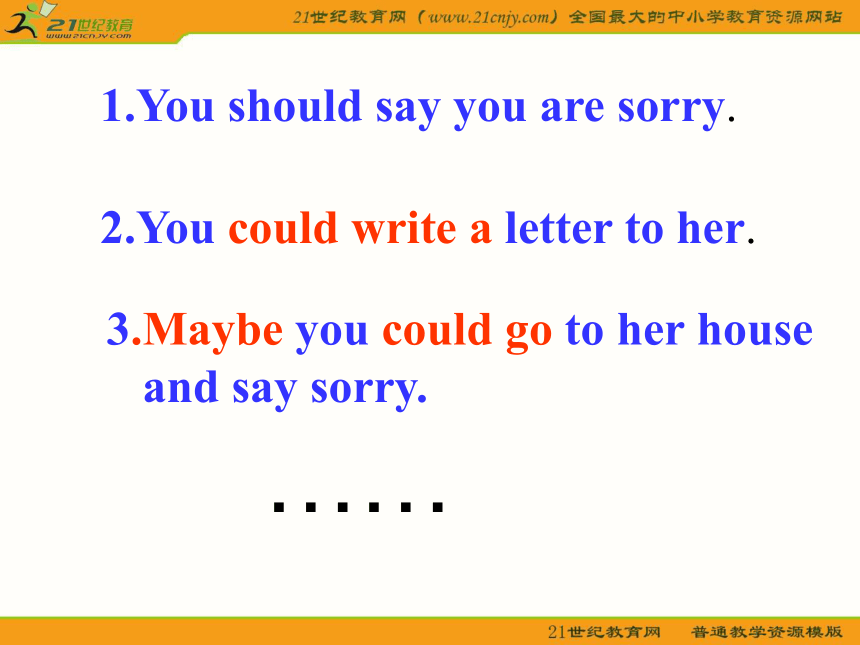

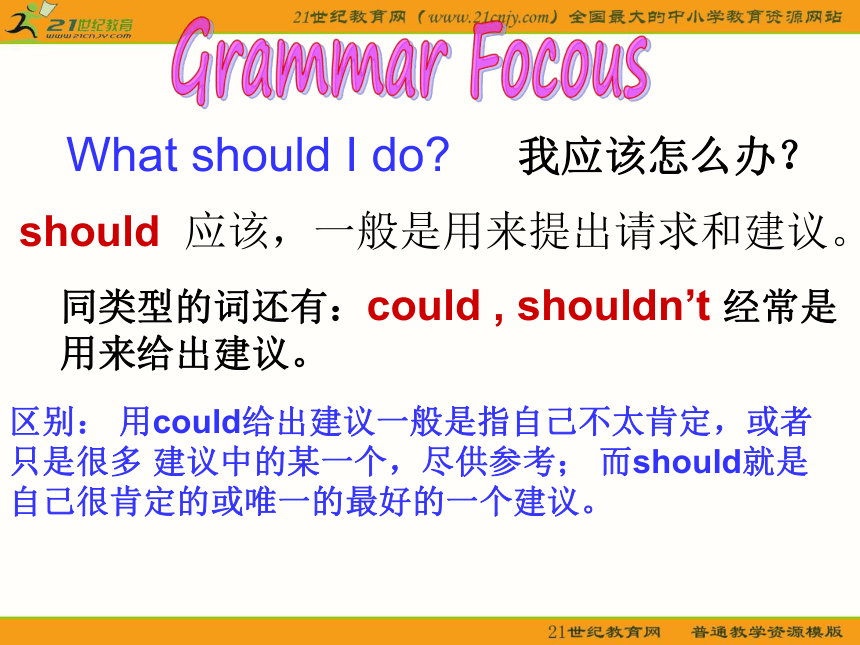
文档简介
(共45张PPT)
Unit 2 What should I do
复习目标:
1.复习掌握本单元的单词及短语
2.熟练运用下列的重点句型:
(1)not…until…
( 2) It’s time for… It’s time to do…
( 3)sb.finds it +adj.+ to do sth.
3.运用本单元句型描述人们日常生活中所遇到的各种问题并给出合理的建议
1、大声的 2、争吵 3、错误的 4、怎么了? 5、can的过去式 6、票 7、使意外 8、任一的 9、把……除外 10、失败 11、到……为止 12、适合 13、包括 14、发送 15、她们自己 16、自由 17、在一方面 18、在另一方面 19、有组织的 20、不让进入 21、不时髦的 22、打电话给… 23、用电话交谈 24、付款 25、与…同样的 26、发型 30、心烦的 31、相处 32、尽可能 33、压力 34、抱怨 35、固执己见的 36、各种 37、比较 39、疯狂的 40、成年人
1.stay at home 呆在家 2. every night 每天晚上
3.play CDs 放CD 4.too loud 太吵
5.out of style 过时的 6.enough money 足够的钱
7.go to his house 去他家
8.give him a ticket 给他一张票
9.a ball game 一场球赛 10.talk about 谈论
11.on the phone 通过电话
12.get some money 得一些钱
13.pay for 支付 14.summer camp 夏令营
15.get a part-time job 做一份兼职工作
16.have a bake sale 卖烧烤
17.the radio advice program 电台建议节目
18.the same as 与...一样
19.the same clothes as 与...一样的衣服
20.get different clothes 买不同的衣服
21.have a problem 有麻烦
22.at school 在学校 23.find out 发现/找出
24.last week 上周 26.busy enough 足够忙
25.after-school activities 课后活动
27.after school 放学后 28.get home 到家
29.as much as possible 尽可能多
30.too much pressure 太多的压力
31.take part in 参加 32.all kinds of 各种各样的
33.on the one hand 在一方面
34.on the other hand 在另外一方面
35.by oneself 亲自
36.a ticket to a ball game一张球票
1.抱怨做某事
2.带某人或某物从某地到某地
3.与某人打架
4.与某人相处融洽
5.对某人说
6.对某人生气
7.邀请某人去做某事
8.告诉某人去做某事
9.让某人去做某事
10.为某人买某物
11.要求某人去做某事
12.为了某事要求某人
13.从某人或某地借某物
14.喜欢做某事
15.打电话给某人
16.写信给某人
17.与某人争吵
18.想要某人做某事
1.complain about doing sth 抱怨做某事
2.take sb/sth from …to… 带某人或某物从某地到某地
3.have a fight with sb 与某人打架
4.get on well with sb 与某人相处融洽
5.say to sb 对某人说
6.be angry with sb 对某人生气
7,invite sb to do sth 邀请某人去做某事
8.tell sb to do sth 告诉某人去做某事
9.get sb to do sth 让某人去做某事
10.buy sth for sb 为某人买某物
11.ask sb to do sth 要求某人去做某事
library yesterday. 12.ask sb for sth 为了某事要求某人
13.borrow sth from sb/sw 从某人或某地借某物
14.like doing sth喜欢做某事
15,call sb up打电话给某人
16.write sb a letter写信给某人
17.argue with sb与某人争吵
18.want sb to do sth 想要某人做某事
What’s the matter
I want to buy a guitar.
But I don’t have enough money.
What should I do
2.You could wait until next year.
1. Don’t buy a guitar.
3. You could get a part time job.
4. You could buy a used guitar.
My advice:
5. Borrow one.
I argued with my best
friend.
What should I do
1.You should say you are sorry.
2.You could write a letter to her.
3.Maybe you could go to her house
and say sorry.
……
Thank you for your advice.
We get on well again.(与…相处的好)
What should I do 我应该怎么办?
should 应该,一般是用来提出请求和建议。
同类型的词还有:could , shouldn’t 经常是用来给出建议。
区别: 用could给出建议一般是指自己不太肯定,或者只是很多 建议中的某一个,尽供参考; 而should就是自己很肯定的或唯一的最好的一个建议。
1.keep out
2.out of style
3.in style
4.call sb. up
5.on the phone
6.the same as
7.as much as possible
8.all kinds of..
9.on the one hand
10.on the other hand
11.agree with
12.write sb. a letter
pare …with…
14.be angry with
15.get on well with
16.have a fight with
17.busy enough
plain about
19.give sb. some advice
20.find out
21.take part in
22.borrow…from…
23.argue with…
24.get a part-time job
25.at a young age
26.Pay for
Form sentences
1、通过电话
2、 得一些钱
3.支付
4、 索要
5、 做一份兼职工作
6、 卖烧烤
7、 电台建议节目
8、 与...一样
9、 与...一样的衣服
10、 买不同的衣服
11、 有麻烦
12、发现,找出
13、 课后活动
14、 足够忙
1、on the phone
2、get some money 3、pay for
4、 ask for
5、get a part-time job
6、have a bake sale
7、 the radio advice program
8、the same as
9、the same clothes as
10、get different clothes 11、have a problem
12、find out
13、after-school activities
14、busy enough
15、 尽可能多
16、 太多的压力
17、 参加
18、 各种各样的
19、 在一方面
20、 在另外一方面
21、 亲自
22. 直到…才
23. 尽可能多
24. 发送到
各种;许多
26. 和…比较
27. 在一方面
28. 在另一方面
15、as much as possible
16、too much pressure
17、take part in
18、all kinds of
19、on the one hand
20、on the other hand
21、by oneself
22.not…until
23.as much as possible
24.send to
25.all kinds of
pare ….with
27.on the one hand
28.on the other hand
We are good friends. We never a_______ with each other.
I have two t______. Let’s go to see the movie.
Do you have a t_________ to help your English study
Do you like p_________ tennis
These old clothes are out of s______ .Nobody likes them.
The bad news s__________ my parents. They didn’t know what to do.
rgue
ickets
eacher
laying
tyle
urprised
7.He is upset because he f_______ his test.
8.The jacket f_______ me well. I like it very much.
9.The students study all day. They are under too much p______________.
10.The football fans are very c______.
11.We need time and f______ to relax ourselves.
12.They learned to swim by t_________.
ailed
its
resure
rasy
reedom
hemselves
1.pay for 为 … 付费2.ask for 向… 索要
3.borrow sth from sb 向… 借某物4.lend sb.sth./ lend sth. to sb 借… 给….
1.I _______ the English book _____ Lucy. 2.I________ my mother_______ money every month
3.My father _________ the internet every year.
4.Lucy __________ me the English book .
borrowed from
ask for
pays for
lent
巩固练习二
用适当的短语或汉语提示填空
1.Yesterday he ____ _____ his best friend.
2.His clothes are_____ _____ ______.
3.Let’s ____ him ____and ask him to play tennis with us.
4.My haircut is ___ ____ ____ Li Lei’s.
5.You could ____some money ____ your brother.
6.My friend is ____ ____me. What should I say to him
7.He ____ 5 dollars ____that book.
8.At last, he____ ____(找出)a new way.
9.The soldiers ____ a _____ with the enemy at that time.
10.You could come here____ ____ ____ ____.(尽可能早的)
综合练习一 用所给词的适当形式填空
1.My parents want me____ (stay) at home every night.
2.They are the same as my ______(friends) clothes.
3.I think Li Ming should tell his friend _____(get) different clothes.
4.I’m very upset and don’t know what ______(do).
5.They finished the work all by_____ (they).
6.Look at the clouds .It______ (rain) soon.
7.I saw a boy _____(cry) when I crossed the street.
8.They find it difficult____ (take) their children from activity to prepare for their future.
9。Those clothes aren’t _____(inexpensive). Let’s buy it.
综合练习二 根据汉语完成句子
1._____ _____I do(我该怎么办)?
2.He needs to get____ ____(足够的钱).
3.Here is____ ____ ____(一张……的票) a ball game.
4.____ ____(怎么了)?
5.----What should he do
-----He could ____ ___ ____ ____(给她写封信)。
6.I’m sorry that you lost your____ ___(运动服).
7.Could you please give me____ ____(一些建议)?
8.I ____ ____ ____ ____ (相处的好)my cousin.
9.Teachers ____ ____(抱怨) teaching tired kids in the classroom.
用such 和so填空
1、We’ve _________ difficult problems that no one would like to continue.
= The problems are _________ difficult that none of us would like to continue.
2、 I don’t like ______ weather.
3、It is______ heavy that I can’t carry it.
besides,but,except填空
1.______Beijing he has been to many other big cities in China.
2. I go to school every day _______ Saturday and Sunday.
3. Everyone went to the Great Wall ___ me.
用spend, take,cost,pay的适当形式填空
1、I ______ two hours on this maths problem.
2、A new computer _______ a lot of money.
3、Remembering these new words _______ him a lot of time.
4.It _______them three years to build this road.
5.They ________two years (in) building this bridge.
6.I have to ______ them 20 pounds for this room each month.
7.Don’t worry! I'll ________ you.
用few, a few, little, a little填空
1、I'll try to make ___ mistakes in the future.
2. He is new here, but he has ______ friends. …但他有几个朋友。
比较:He is new here, and he has ______ friends. …他几乎没朋友。
3. There is ________ milk in the cup. 杯子里没有牛奶了。
4.He has _______ money with him. 他随身带了点儿钱。
可修饰比较级的词
a bit, a little, rather, much, far, by far, many, a lot, lots, a great deal, any, still, even等可修饰比较级
1. - Are you feeling ________ -Yes,I'm fine now.
A. any well B. any better C. quite good D. quite better
2. The experiment was____ easier than we had expected.
A. more B. much more C. much D. more much
3.If there were no examinations(考试), we should have ___ at school.
A. the happiest time B. a more happier time
C. much happiest time D. a much happier time
巩固练习三 翻译下列句子
1.该做作业了
2.该吃晚饭了
3.直到7点钟他们才回家
4.直到老师来了他们才停止说话
5.我发现学好英语很难。
6.李平发现写一封信很简单
7.一方面,他是个老师,另一方面,他又是个医生
1. It’s time to do homework. It’s time for homework.
2. It’s time to have supper. It’s time for supper.
3. They didn’t go home until seven o’clock.
4. They didn’t stop talking until the teacher came.
5. I found it difficult to learn English well.
6. Li Ping found it easy to write a letter.
7. On the one hand, he is a teacher. On the other hand, he is also a doctor.
1.My mother wants me____________( be ) a scientist in the future.
2. I always argue __________ my sister. 3.Many students _________ (borrow) some books _________ the school library yesterday.
4.Li Ping _________ (ask) his parents _________ a new football tomorrow. 5.Our teacher asked us __________ (clean) the classroom.
6.We must _________ (buy) some gifts _________ our parents’ birthday. 7.You can get him ____________ (finish) his homework .
8.My grandfather often ____________ (tell) me __________ ( study) harder. 9.My best friend invited me ________ (come) to his last birthday party. 10.Our math teacher is angry __________ him.
My mother wants me to be a scientist in the future.
want sb to do sth 想要某人做某事
2. I always argue with my sister.
argue with sb与某人争吵
3. Many students borrowed some books from the school library yesterday.
borrow sth. from sb./sw. 从某人或某地借某物 4.Li Ping will ask his parents for a new football tomorrow.
ask sb. for sth. 为了某事要求某人
5.Our teacher asked us to clean the classroom.
ask sb to do sth 要求某人去做某事
6. We must buy some gifts for our parents’ birthday.
buy sth. for sb. 为某人买某物 7. You can get him to finish his homework . get sb. to do sth. 让某人去做某事 8. My grandfather often tells me to study harder.
tell sb. to do sth. 告诉某人去做某事 9. My best friend invited me to come to his birthday party.
invite sb to do sth 邀请某人去做某事 10.Our math teacher is angry with him.
be angry with sb 对某人生气
11.My mother said________ me :”You should study harder.” 12.We must get on well_________ animals all over the world. 13.Good students shouldn’t have a ___________ with their classmates in the class. 14.My parents will take me _______Beijing _______ Shanghai .15.You must try ____________ (finish) your homework. 16.Many students complain about _________ (do) too much homework . 17.I don’t have ___________ (足够的钱)。 18.This room is ___________ (够大)to hold 100 people. 19.He has some money, too. (改否定句) 20.I don’t want to________________ (使他感到吃惊)。 21.What she said was ______________(令人吃惊)。
11. My mother said to me :’’You should study harder.” say to sb 对某人说 12. We must get on well with animals all over the world.
get on well with sb. 与某人相处融洽 13. Good students shouldn’t have a fight with their classmates in the class.
have a fight with sb. 与某人打架 14. My parents will take me from Beijing to Shanghai .
take sb./ sth. from …to… 带某人或某物从某地到某地 15. You must try to finish your homework.
try to do sth. 尽力去做某事 16. Many students complain about doing too much homework .
complain about doing sth. 抱怨做某事
17.I don’t have enough money.我没有足够的钱。 enough 足够的 修饰名词:enough +n. 修饰形容词或副词:adj /adv + enough 18.This room is big enough to hold 100 people.这间房间够大,能容纳一百人。 19.He doesn’t have any money, either.他也没有钱。either 也(用于否定句) too 也(用于肯定句或疑问句) 20.I don’t want to surprise him. 我不想使他感到吃惊。 surprise是动词,“使…感到吃惊“,做名词时,表示”一件奇怪或吃惊的事“That was a surprise!真是奇怪! We were surprised at what he said.我们对他的话感到惊奇。 surprised 和surprising是形容词,surprised与人连用,指人“对…感到惊奇”。而surprising与物连用,表示“令人感到惊奇”。 21.What she said was surprising. 他的话令人吃惊。
22.You could give him a ticket__________ a ball game.
23.My clothes are _________ style.
24.Maybe you should call him ___________. 25.___________ (或许)you are right. 26.Maybe they will go out for a walk. 27.It __________ (或许) true. 28.I need _________ ( get )some money to pay for summer camp.
29.他昨天花10元买了一本书。(用三种句型) ①He ______ 10 yuan ________ the book yesterday. ②He _________ 10 yuan ________the book yesterday. ③The book _________ him 10 yuan yesterday.
22.You could give him a ticket to a ball game.你可以给他一张球票。 a ticket to a ball game中to表所属关系。表示所属关系一般用of,但有几个用to, 如:the answer to the question这个问题的答案。 the key to the door门上的钥匙 the way to the station到车站的路 23. My clothes are out of style.我的衣服过时了。 be out of style / fashion表示“过时”“不合乎时尚” 反义词是“be in fashion”表示“合乎时尚” eg. He is always in fashion. 24. Maybe you should call him up. (1)maybe是副词,用来表示推测,译为“也许,或许,大概”。25. Maybe you are right. Maybe they will go out for a walk. maybe不同于may be。maybe是一个词,是副词,may be是情态动词 may加上动词原形be,意为"或许",后接形容词、名词、代词等。
maybe不同于may be。maybe是一个词,是副词,may be是情态动词may加上动词原形be,意为"或许",后接形容词、名词、代词等。 27. It may be true. He may be the man we are looking for. 28. I need to get some money to pay for summer camp.我需要一些钱支付夏令营。 (1)need是个情态动词,也可以是行为动词。 ▲当它是情态动词时,后边直接加行为动词,表示"需要",但need作情态动词时一般不用于肯定句。它一般用于否定句和疑问句中,例如: ①You need not meet him.你不必见他。 ②Need I repeat it 我有必要重复它吗? 对上一句的简略回答为:Yes, you need. No, you needn't.
▲此外情态动词must提问时,否定回答时为No, ... needn't。 例如:Must he finish the homework now Yes, he must. No, he needn't. 当need作行为动词时,同其他行为动词一样对待,need后加不定式为"need to do"。 例如:I need to finish the work. 变为疑问句时,不能像它作情态动词时直接提前,而要加助动词do/ does/ did等,例如:He needs to write many words. 改成一般问句:Does he need to write many words Yes, he does. No, he doesn't. (2)(sb.)pay(money)for sth.为......而付款 (sb.)spend(money)on sth在......上花多少钱 (sth.)cost sb.(money)什么东西值多少钱 这三个短语都是表示付款。但pay, spend指的是"人",主语为人,而cost指的是"物",主语为"物"。
29.他昨天花10元买了一本书。 ①He paid 10 yuan for the book yesterday. ②He spent 10 yuan on the book yesterday. ③The book cost him 10 yuan yesterday. 语法知识: 情态动词的用法 它和基本助动词(be, do, have)都属于助动词类。 * 情态动词没有人称和数的变化。 * 常用的情态动词有:can, could, may, might, must, shall, should, will, would这九大情态动词;其他的还有ought to, need, dare 等。 一、九大情态动词的时态关系: 1. 现在式 can -- 过去式 could 2. 现在式 may -- 过去式 might 3. 现在式 shall -- 过去式 should 4. 现在式 will -- 过去式 would 5. 现在式 must -- 过去式 must (常用had to来代替)
二、情态动词表示“可能”或“预测” (can, could, will, would, shall, should, must, ought to) (1)can 和 could 用于表示“可能”或“预测”: He can‘t be at home. (否定句) 他不可能在家。 (2)may 和 might 用于表示“事实上的可能性”或“预测”: It may rain tomorrow. (表示可能会发生) 明天可能会下雨。
(3)will 和 would 用于表示“预测”或“习惯性”: I think he will be all right now. (will be 表示一定会) 我想他现在一定好了。
(4)shall 和 should 用于表示“必定”: I shall be rich one day. (shall be )总有一天我会发达的。 (5)must 用于表示“必定”,“必会”: This must be good for you. (must be 肯定) 这肯定对你是有益的。
三、情态动词表示“许可”、“请求” (can, could, will, would, shall, should, may, might, must)
(1)can 和 could 用于表示“许可”、“请求”: 1. Can I go with you (请求) 我能跟你一起走吗? 2. Father said I could go to cinema. (表示过去的许可) 爸爸说我可以去看电影。 3. Could I ask you something (请求,用 could 比 can 更婉转) 我可以问你一件事吗? (2)will 和 would 用于表示“请求” 1. Will you kindly tell me the way to the post office (表示客气请求) 请问到邮局怎么走? 2. Would you give me your address (用 would 比 will 表示更客气) 请你告诉我你的地址,好吗?
(3)shall 和 should 用于第一人称,表示征求对方的意见 1. Shall we talk 我们谈谈好吗?
2. What should we do next (用should 比 shall 表示更客气) 下一步我们该怎么做? 3. Shall he come to see you (用于第三人称疑问句) 要不要他来看你?
(4)may 和 might 用于表示“许可”(口语中多用 can ) 1. You may take a walk. (表示给予许可)你可以散散步。 2. You might read the story for me. (比may更婉转) 是否请给我读一读这故事。 3. May I make a suggestion 我可以提个建议吗? 4. Might I take a look of your work 我看看您的大作行吗? (5)must 用于表示“禁止”,“不准”: 1. Cars must not be parked here. (must not表示不许可) 此地不准停车。 2. All of you mustn't fish in the pool. (must not 语气方面比 may not 更强) 你们不准在池里钓鱼。
Unit 2 What should I do
复习目标:
1.复习掌握本单元的单词及短语
2.熟练运用下列的重点句型:
(1)not…until…
( 2) It’s time for… It’s time to do…
( 3)sb.finds it +adj.+ to do sth.
3.运用本单元句型描述人们日常生活中所遇到的各种问题并给出合理的建议
1、大声的 2、争吵 3、错误的 4、怎么了? 5、can的过去式 6、票 7、使意外 8、任一的 9、把……除外 10、失败 11、到……为止 12、适合 13、包括 14、发送 15、她们自己 16、自由 17、在一方面 18、在另一方面 19、有组织的 20、不让进入 21、不时髦的 22、打电话给… 23、用电话交谈 24、付款 25、与…同样的 26、发型 30、心烦的 31、相处 32、尽可能 33、压力 34、抱怨 35、固执己见的 36、各种 37、比较 39、疯狂的 40、成年人
1.stay at home 呆在家 2. every night 每天晚上
3.play CDs 放CD 4.too loud 太吵
5.out of style 过时的 6.enough money 足够的钱
7.go to his house 去他家
8.give him a ticket 给他一张票
9.a ball game 一场球赛 10.talk about 谈论
11.on the phone 通过电话
12.get some money 得一些钱
13.pay for 支付 14.summer camp 夏令营
15.get a part-time job 做一份兼职工作
16.have a bake sale 卖烧烤
17.the radio advice program 电台建议节目
18.the same as 与...一样
19.the same clothes as 与...一样的衣服
20.get different clothes 买不同的衣服
21.have a problem 有麻烦
22.at school 在学校 23.find out 发现/找出
24.last week 上周 26.busy enough 足够忙
25.after-school activities 课后活动
27.after school 放学后 28.get home 到家
29.as much as possible 尽可能多
30.too much pressure 太多的压力
31.take part in 参加 32.all kinds of 各种各样的
33.on the one hand 在一方面
34.on the other hand 在另外一方面
35.by oneself 亲自
36.a ticket to a ball game一张球票
1.抱怨做某事
2.带某人或某物从某地到某地
3.与某人打架
4.与某人相处融洽
5.对某人说
6.对某人生气
7.邀请某人去做某事
8.告诉某人去做某事
9.让某人去做某事
10.为某人买某物
11.要求某人去做某事
12.为了某事要求某人
13.从某人或某地借某物
14.喜欢做某事
15.打电话给某人
16.写信给某人
17.与某人争吵
18.想要某人做某事
1.complain about doing sth 抱怨做某事
2.take sb/sth from …to… 带某人或某物从某地到某地
3.have a fight with sb 与某人打架
4.get on well with sb 与某人相处融洽
5.say to sb 对某人说
6.be angry with sb 对某人生气
7,invite sb to do sth 邀请某人去做某事
8.tell sb to do sth 告诉某人去做某事
9.get sb to do sth 让某人去做某事
10.buy sth for sb 为某人买某物
11.ask sb to do sth 要求某人去做某事
library yesterday. 12.ask sb for sth 为了某事要求某人
13.borrow sth from sb/sw 从某人或某地借某物
14.like doing sth喜欢做某事
15,call sb up打电话给某人
16.write sb a letter写信给某人
17.argue with sb与某人争吵
18.want sb to do sth 想要某人做某事
What’s the matter
I want to buy a guitar.
But I don’t have enough money.
What should I do
2.You could wait until next year.
1. Don’t buy a guitar.
3. You could get a part time job.
4. You could buy a used guitar.
My advice:
5. Borrow one.
I argued with my best
friend.
What should I do
1.You should say you are sorry.
2.You could write a letter to her.
3.Maybe you could go to her house
and say sorry.
……
Thank you for your advice.
We get on well again.(与…相处的好)
What should I do 我应该怎么办?
should 应该,一般是用来提出请求和建议。
同类型的词还有:could , shouldn’t 经常是用来给出建议。
区别: 用could给出建议一般是指自己不太肯定,或者只是很多 建议中的某一个,尽供参考; 而should就是自己很肯定的或唯一的最好的一个建议。
1.keep out
2.out of style
3.in style
4.call sb. up
5.on the phone
6.the same as
7.as much as possible
8.all kinds of..
9.on the one hand
10.on the other hand
11.agree with
12.write sb. a letter
pare …with…
14.be angry with
15.get on well with
16.have a fight with
17.busy enough
plain about
19.give sb. some advice
20.find out
21.take part in
22.borrow…from…
23.argue with…
24.get a part-time job
25.at a young age
26.Pay for
Form sentences
1、通过电话
2、 得一些钱
3.支付
4、 索要
5、 做一份兼职工作
6、 卖烧烤
7、 电台建议节目
8、 与...一样
9、 与...一样的衣服
10、 买不同的衣服
11、 有麻烦
12、发现,找出
13、 课后活动
14、 足够忙
1、on the phone
2、get some money 3、pay for
4、 ask for
5、get a part-time job
6、have a bake sale
7、 the radio advice program
8、the same as
9、the same clothes as
10、get different clothes 11、have a problem
12、find out
13、after-school activities
14、busy enough
15、 尽可能多
16、 太多的压力
17、 参加
18、 各种各样的
19、 在一方面
20、 在另外一方面
21、 亲自
22. 直到…才
23. 尽可能多
24. 发送到
各种;许多
26. 和…比较
27. 在一方面
28. 在另一方面
15、as much as possible
16、too much pressure
17、take part in
18、all kinds of
19、on the one hand
20、on the other hand
21、by oneself
22.not…until
23.as much as possible
24.send to
25.all kinds of
pare ….with
27.on the one hand
28.on the other hand
We are good friends. We never a_______ with each other.
I have two t______. Let’s go to see the movie.
Do you have a t_________ to help your English study
Do you like p_________ tennis
These old clothes are out of s______ .Nobody likes them.
The bad news s__________ my parents. They didn’t know what to do.
rgue
ickets
eacher
laying
tyle
urprised
7.He is upset because he f_______ his test.
8.The jacket f_______ me well. I like it very much.
9.The students study all day. They are under too much p______________.
10.The football fans are very c______.
11.We need time and f______ to relax ourselves.
12.They learned to swim by t_________.
ailed
its
resure
rasy
reedom
hemselves
1.pay for 为 … 付费2.ask for 向… 索要
3.borrow sth from sb 向… 借某物4.lend sb.sth./ lend sth. to sb 借… 给….
1.I _______ the English book _____ Lucy. 2.I________ my mother_______ money every month
3.My father _________ the internet every year.
4.Lucy __________ me the English book .
borrowed from
ask for
pays for
lent
巩固练习二
用适当的短语或汉语提示填空
1.Yesterday he ____ _____ his best friend.
2.His clothes are_____ _____ ______.
3.Let’s ____ him ____and ask him to play tennis with us.
4.My haircut is ___ ____ ____ Li Lei’s.
5.You could ____some money ____ your brother.
6.My friend is ____ ____me. What should I say to him
7.He ____ 5 dollars ____that book.
8.At last, he____ ____(找出)a new way.
9.The soldiers ____ a _____ with the enemy at that time.
10.You could come here____ ____ ____ ____.(尽可能早的)
综合练习一 用所给词的适当形式填空
1.My parents want me____ (stay) at home every night.
2.They are the same as my ______(friends) clothes.
3.I think Li Ming should tell his friend _____(get) different clothes.
4.I’m very upset and don’t know what ______(do).
5.They finished the work all by_____ (they).
6.Look at the clouds .It______ (rain) soon.
7.I saw a boy _____(cry) when I crossed the street.
8.They find it difficult____ (take) their children from activity to prepare for their future.
9。Those clothes aren’t _____(inexpensive). Let’s buy it.
综合练习二 根据汉语完成句子
1._____ _____I do(我该怎么办)?
2.He needs to get____ ____(足够的钱).
3.Here is____ ____ ____(一张……的票) a ball game.
4.____ ____(怎么了)?
5.----What should he do
-----He could ____ ___ ____ ____(给她写封信)。
6.I’m sorry that you lost your____ ___(运动服).
7.Could you please give me____ ____(一些建议)?
8.I ____ ____ ____ ____ (相处的好)my cousin.
9.Teachers ____ ____(抱怨) teaching tired kids in the classroom.
用such 和so填空
1、We’ve _________ difficult problems that no one would like to continue.
= The problems are _________ difficult that none of us would like to continue.
2、 I don’t like ______ weather.
3、It is______ heavy that I can’t carry it.
besides,but,except填空
1.______Beijing he has been to many other big cities in China.
2. I go to school every day _______ Saturday and Sunday.
3. Everyone went to the Great Wall ___ me.
用spend, take,cost,pay的适当形式填空
1、I ______ two hours on this maths problem.
2、A new computer _______ a lot of money.
3、Remembering these new words _______ him a lot of time.
4.It _______them three years to build this road.
5.They ________two years (in) building this bridge.
6.I have to ______ them 20 pounds for this room each month.
7.Don’t worry! I'll ________ you.
用few, a few, little, a little填空
1、I'll try to make ___ mistakes in the future.
2. He is new here, but he has ______ friends. …但他有几个朋友。
比较:He is new here, and he has ______ friends. …他几乎没朋友。
3. There is ________ milk in the cup. 杯子里没有牛奶了。
4.He has _______ money with him. 他随身带了点儿钱。
可修饰比较级的词
a bit, a little, rather, much, far, by far, many, a lot, lots, a great deal, any, still, even等可修饰比较级
1. - Are you feeling ________ -Yes,I'm fine now.
A. any well B. any better C. quite good D. quite better
2. The experiment was____ easier than we had expected.
A. more B. much more C. much D. more much
3.If there were no examinations(考试), we should have ___ at school.
A. the happiest time B. a more happier time
C. much happiest time D. a much happier time
巩固练习三 翻译下列句子
1.该做作业了
2.该吃晚饭了
3.直到7点钟他们才回家
4.直到老师来了他们才停止说话
5.我发现学好英语很难。
6.李平发现写一封信很简单
7.一方面,他是个老师,另一方面,他又是个医生
1. It’s time to do homework. It’s time for homework.
2. It’s time to have supper. It’s time for supper.
3. They didn’t go home until seven o’clock.
4. They didn’t stop talking until the teacher came.
5. I found it difficult to learn English well.
6. Li Ping found it easy to write a letter.
7. On the one hand, he is a teacher. On the other hand, he is also a doctor.
1.My mother wants me____________( be ) a scientist in the future.
2. I always argue __________ my sister. 3.Many students _________ (borrow) some books _________ the school library yesterday.
4.Li Ping _________ (ask) his parents _________ a new football tomorrow. 5.Our teacher asked us __________ (clean) the classroom.
6.We must _________ (buy) some gifts _________ our parents’ birthday. 7.You can get him ____________ (finish) his homework .
8.My grandfather often ____________ (tell) me __________ ( study) harder. 9.My best friend invited me ________ (come) to his last birthday party. 10.Our math teacher is angry __________ him.
My mother wants me to be a scientist in the future.
want sb to do sth 想要某人做某事
2. I always argue with my sister.
argue with sb与某人争吵
3. Many students borrowed some books from the school library yesterday.
borrow sth. from sb./sw. 从某人或某地借某物 4.Li Ping will ask his parents for a new football tomorrow.
ask sb. for sth. 为了某事要求某人
5.Our teacher asked us to clean the classroom.
ask sb to do sth 要求某人去做某事
6. We must buy some gifts for our parents’ birthday.
buy sth. for sb. 为某人买某物 7. You can get him to finish his homework . get sb. to do sth. 让某人去做某事 8. My grandfather often tells me to study harder.
tell sb. to do sth. 告诉某人去做某事 9. My best friend invited me to come to his birthday party.
invite sb to do sth 邀请某人去做某事 10.Our math teacher is angry with him.
be angry with sb 对某人生气
11.My mother said________ me :”You should study harder.” 12.We must get on well_________ animals all over the world. 13.Good students shouldn’t have a ___________ with their classmates in the class. 14.My parents will take me _______Beijing _______ Shanghai .15.You must try ____________ (finish) your homework. 16.Many students complain about _________ (do) too much homework . 17.I don’t have ___________ (足够的钱)。 18.This room is ___________ (够大)to hold 100 people. 19.He has some money, too. (改否定句) 20.I don’t want to________________ (使他感到吃惊)。 21.What she said was ______________(令人吃惊)。
11. My mother said to me :’’You should study harder.” say to sb 对某人说 12. We must get on well with animals all over the world.
get on well with sb. 与某人相处融洽 13. Good students shouldn’t have a fight with their classmates in the class.
have a fight with sb. 与某人打架 14. My parents will take me from Beijing to Shanghai .
take sb./ sth. from …to… 带某人或某物从某地到某地 15. You must try to finish your homework.
try to do sth. 尽力去做某事 16. Many students complain about doing too much homework .
complain about doing sth. 抱怨做某事
17.I don’t have enough money.我没有足够的钱。 enough 足够的 修饰名词:enough +n. 修饰形容词或副词:adj /adv + enough 18.This room is big enough to hold 100 people.这间房间够大,能容纳一百人。 19.He doesn’t have any money, either.他也没有钱。either 也(用于否定句) too 也(用于肯定句或疑问句) 20.I don’t want to surprise him. 我不想使他感到吃惊。 surprise是动词,“使…感到吃惊“,做名词时,表示”一件奇怪或吃惊的事“That was a surprise!真是奇怪! We were surprised at what he said.我们对他的话感到惊奇。 surprised 和surprising是形容词,surprised与人连用,指人“对…感到惊奇”。而surprising与物连用,表示“令人感到惊奇”。 21.What she said was surprising. 他的话令人吃惊。
22.You could give him a ticket__________ a ball game.
23.My clothes are _________ style.
24.Maybe you should call him ___________. 25.___________ (或许)you are right. 26.Maybe they will go out for a walk. 27.It __________ (或许) true. 28.I need _________ ( get )some money to pay for summer camp.
29.他昨天花10元买了一本书。(用三种句型) ①He ______ 10 yuan ________ the book yesterday. ②He _________ 10 yuan ________the book yesterday. ③The book _________ him 10 yuan yesterday.
22.You could give him a ticket to a ball game.你可以给他一张球票。 a ticket to a ball game中to表所属关系。表示所属关系一般用of,但有几个用to, 如:the answer to the question这个问题的答案。 the key to the door门上的钥匙 the way to the station到车站的路 23. My clothes are out of style.我的衣服过时了。 be out of style / fashion表示“过时”“不合乎时尚” 反义词是“be in fashion”表示“合乎时尚” eg. He is always in fashion. 24. Maybe you should call him up. (1)maybe是副词,用来表示推测,译为“也许,或许,大概”。25. Maybe you are right. Maybe they will go out for a walk. maybe不同于may be。maybe是一个词,是副词,may be是情态动词 may加上动词原形be,意为"或许",后接形容词、名词、代词等。
maybe不同于may be。maybe是一个词,是副词,may be是情态动词may加上动词原形be,意为"或许",后接形容词、名词、代词等。 27. It may be true. He may be the man we are looking for. 28. I need to get some money to pay for summer camp.我需要一些钱支付夏令营。 (1)need是个情态动词,也可以是行为动词。 ▲当它是情态动词时,后边直接加行为动词,表示"需要",但need作情态动词时一般不用于肯定句。它一般用于否定句和疑问句中,例如: ①You need not meet him.你不必见他。 ②Need I repeat it 我有必要重复它吗? 对上一句的简略回答为:Yes, you need. No, you needn't.
▲此外情态动词must提问时,否定回答时为No, ... needn't。 例如:Must he finish the homework now Yes, he must. No, he needn't. 当need作行为动词时,同其他行为动词一样对待,need后加不定式为"need to do"。 例如:I need to finish the work. 变为疑问句时,不能像它作情态动词时直接提前,而要加助动词do/ does/ did等,例如:He needs to write many words. 改成一般问句:Does he need to write many words Yes, he does. No, he doesn't. (2)(sb.)pay(money)for sth.为......而付款 (sb.)spend(money)on sth在......上花多少钱 (sth.)cost sb.(money)什么东西值多少钱 这三个短语都是表示付款。但pay, spend指的是"人",主语为人,而cost指的是"物",主语为"物"。
29.他昨天花10元买了一本书。 ①He paid 10 yuan for the book yesterday. ②He spent 10 yuan on the book yesterday. ③The book cost him 10 yuan yesterday. 语法知识: 情态动词的用法 它和基本助动词(be, do, have)都属于助动词类。 * 情态动词没有人称和数的变化。 * 常用的情态动词有:can, could, may, might, must, shall, should, will, would这九大情态动词;其他的还有ought to, need, dare 等。 一、九大情态动词的时态关系: 1. 现在式 can -- 过去式 could 2. 现在式 may -- 过去式 might 3. 现在式 shall -- 过去式 should 4. 现在式 will -- 过去式 would 5. 现在式 must -- 过去式 must (常用had to来代替)
二、情态动词表示“可能”或“预测” (can, could, will, would, shall, should, must, ought to) (1)can 和 could 用于表示“可能”或“预测”: He can‘t be at home. (否定句) 他不可能在家。 (2)may 和 might 用于表示“事实上的可能性”或“预测”: It may rain tomorrow. (表示可能会发生) 明天可能会下雨。
(3)will 和 would 用于表示“预测”或“习惯性”: I think he will be all right now. (will be 表示一定会) 我想他现在一定好了。
(4)shall 和 should 用于表示“必定”: I shall be rich one day. (shall be )总有一天我会发达的。 (5)must 用于表示“必定”,“必会”: This must be good for you. (must be 肯定) 这肯定对你是有益的。
三、情态动词表示“许可”、“请求” (can, could, will, would, shall, should, may, might, must)
(1)can 和 could 用于表示“许可”、“请求”: 1. Can I go with you (请求) 我能跟你一起走吗? 2. Father said I could go to cinema. (表示过去的许可) 爸爸说我可以去看电影。 3. Could I ask you something (请求,用 could 比 can 更婉转) 我可以问你一件事吗? (2)will 和 would 用于表示“请求” 1. Will you kindly tell me the way to the post office (表示客气请求) 请问到邮局怎么走? 2. Would you give me your address (用 would 比 will 表示更客气) 请你告诉我你的地址,好吗?
(3)shall 和 should 用于第一人称,表示征求对方的意见 1. Shall we talk 我们谈谈好吗?
2. What should we do next (用should 比 shall 表示更客气) 下一步我们该怎么做? 3. Shall he come to see you (用于第三人称疑问句) 要不要他来看你?
(4)may 和 might 用于表示“许可”(口语中多用 can ) 1. You may take a walk. (表示给予许可)你可以散散步。 2. You might read the story for me. (比may更婉转) 是否请给我读一读这故事。 3. May I make a suggestion 我可以提个建议吗? 4. Might I take a look of your work 我看看您的大作行吗? (5)must 用于表示“禁止”,“不准”: 1. Cars must not be parked here. (must not表示不许可) 此地不准停车。 2. All of you mustn't fish in the pool. (must not 语气方面比 may not 更强) 你们不准在池里钓鱼。
同课章节目录
- Unit 1 Could you please clean your room?
- Section A
- Section B
- Unit 2 Why don't you talk to your parents?
- Section A
- Section B
- Unit 3 What were you doing when the rainstorm came
- Section A
- Section B
- Unit 4 An old man tried to move the mountains.
- Section A
- Section B
- Unit 5 What's the highest mountain in the world?
- Section A
- Section B
- Unit 6 Have you read Treasure Island yet?
- Section A
- Section B
- Unit 7 Have you ever been to a museum?
- Section A
- Section B
- Unit 8 I've had this bike for three years.
- Section A
- Section B
